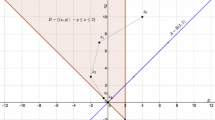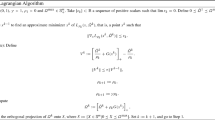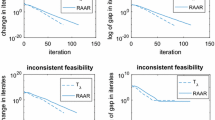Abstract
The affine scaling algorithm is one of the earliest interior point methods developed for linear programming. This algorithm is simple and elegant in terms of its geometric interpretation, but it is notoriously difficult to prove its convergence. It often requires additional restrictive conditions such as nondegeneracy, specific initial solutions, and/or small step length to guarantee its global convergence. This situation is made worse when it comes to applying the affine scaling idea to the solution of semidefinite optimization problems or more general convex optimization problems. In (Math Program 83(1–3):393–406, 1998), Muramatsu presented an example of linear semidefinite programming, for which the affine scaling algorithm with either short or long step converges to a non-optimal point. This paper aims at developing a strategy that guarantees the global convergence for the affine scaling algorithm in the context of linearly constrained convex semidefinite optimization in a least restrictive manner. We propose a new rule of step size, which is similar to the Armijo rule, and prove that such an affine scaling algorithm is globally convergent in the sense that each accumulation point of the sequence generated by the algorithm is an optimal solution as long as the optimal solution set is nonempty and bounded. The algorithm is least restrictive in the sense that it allows the problem to be degenerate and it may start from any interior feasible point.
Similar content being viewed by others
References
Alizadeh, F., Haeberly, J.P.A., Overton, M.L.: Primal-dual interior-point methods for semidefinite programming: convergence rates, stability and numerical results. SIAM J. Optim. 8, 746–768 (1998)
Barnes, E.R.: A variation on Karmarkar’s algorithm for solving linear programming problems. Math. Program. 36, 174–182 (1986)
Bertsekas, D.P.: Nonlinear Programming, 2nd edn. Athena Scientific, Belmont (1999)
Boyd, S., Vandenberghe, L.: Convex Optimization. Cambridge University Press, Cambridge (2004)
Dikin, I.I.: Iterative solution of problems of linear and quadratic programming. Sov. Math. Dokl. 8, 674–675 (1967). (in Russian)
Faybusovich, L.: Dikin’s algorithm for matrix linear programming problems. In: System Modelling and Optimization, Springer, pp. 237–247 (1994)
Gonzaga, C.C., Carlos, L.A.: A primal affine scaling algorithm for linearly constrained convex programs. Tech. Report ES-238/90, Department of Systems Engineering and Computer Science, COPPE Federal University of Rio de Janeiro, Rio de Janeiro (1990)
Graña Drummond, L.M., Iusem, A.N., Svaiter, B.F.: On the central path for nonlinear semidefinite programming. RAIRO Oper. Res. 34, 331–345 (2000)
Horn, R.A., Johnson, C.R.: Matrix Analysis. Cambridge University Press, Cambridge (2012)
Halická, M., de Klerk, E., Roos, C.: On the convergence of the central path in semidefinite optimization. SIAM J. Optim. 12, 1090–1099 (2002)
Halická, M., Trnovská, M.: Limiting behavior and analyticity of weighted central paths in semidefinite programming. Optim. Methods Softw. 25, 247–262 (2010)
Li, L., Toh, K.C.: A polynomial-time inexact primal-dual infeasible path-following algorithm for convex quadratic SDP. Pac. J. Optim. 7(1), 43–61 (2011)
López, J., Ramírez, H.C.: On the central paths and cauchy trajectories in semidefinite programming. Kybernetika 46, 524–535 (2010)
Losert, V., Akin, E.: Dynamics of games and genes: discrete versus continuous time. J. Math. Biol. 17, 241–251 (1983)
Lu, Z., Monteiro, R.D.C.: Limiting behavior of the Alizadeh–Haeberly–Overton weighted paths in semidefinite programming. Optim. Methods Softw. 22, 849–870 (2007)
Luo, Z.Q., Sturm, J.F., Zhang, S.Z.: Superlinear convergence of a symmetric primal-dual path following algorithm for semidefinite programming. SIAM J. Optim. 8(1), 59–81 (1998)
Monteiro, R.D.C.: Primal-dual path-following algorithms for semidefinite programming. SIAM J. Optim. 7, 663–678 (1997)
Monteiro, R.D.C., Wang, Y.: Trust region affine scaling algorithms for linearly constrained convex and concave programs. Math. Program. 80(3), 283–313 (1998)
Monteiro, R.D.C., Zhang, Y.: A unified analysis for a class of long-step primal–dual path-following interior-point algorithms for semidefinite programming. Math. Program. 81(3), 281–299 (1998)
Muramatsu, M.: Affine scaling algorithm fails for semidefinite programming. Math. Program. 83(1–3), 393–406 (1998)
Nie, J.W., Yuan, Y.X.: A predictorcorrector algorithm for QSDP combining Dikin-type and Newton centering steps. Ann. Oper. Res. 103, 115–133 (2001)
Renegar, J., Sondjaja, M.: A polynomial-time affine-scaling method for semidefinite and hyperbolic programming arXiv: 1410.6734 (2014)
Rockafellar, R.T.: Convex Analysis. Princeton Mathematical Series, No. 28. Princeton University Press, Princeton (1970)
Sim, C.-K., Zhao, G.: Asymptotic behavior of HKM paths in interior point methods for monotone semidefinite linear complementarity problems: general theory. J. Optim. Theory Appl. 137, 11–25 (2008)
Sturm, J.F., Zhang, S.: Symmetric primal–dual path-following algorithms for semidefinite programming. Appl. Numer. Math. 29(3), 301–315 (1999)
Sun, J.: A convergence proof for an affine scaling algorithm for convex quadratic programming without nondegeneracy assumptions. Math. Program. 60, 69–79 (1993)
Sun, J.: A convergence analysis for a convex version of Dikin’s algorithm. Ann. Oper. Res. 62(1), 357–374 (1996)
Todd, M.J., Toh, K.C., Tütüncü, R.H.: On the Nesterov–Todd direction in semidefinite programming. SIAM J. Optim. 8, 769–796 (1998)
Toh, K.C., Todd, M.J., Tütüncü, R.H.: SDPT3a MATLAB software package for semidefinite programming, version 1.3. Optim. Methods Softw. 11(1–4), 545–581 (1999)
Toh, K.C.: An inexact primal–dual path following algorithm for convex quadratic SDP. Math. Program. 112(1), 221–254 (2008)
Toh, K.C., Tütüncü, R.H., Todd, M.J.: Inexact primal–dual path-following algorithms for a special class of convex quadratic SDP and related problems. Pac. J. Optim. 3(1), 135–164 (2007)
Tseng, P., Bomze, I.M., Schachinger, W.: A first-order interior point method for linearly constrained smooth optimization. Math. Program. 127, 399–424 (2011)
Vanderbei, R.J., Meketon, M.S., Freedman, B.A.: A modification of Karmarkar’s linear programming algorithm. Algorithmica 1, 395–407 (1986)
Yamashita, M., Fujisawa, K., Kojima, M.: Implementation and evaluation of SDPA 6.0 (semidefinite programming algorithm 6.0). Optim. Methods Softw. 18(4), 491–505 (2003)
Wolkowicz, H., Saigal, R., Vandenberghe, L.: Handbook of Semidefinite Programming: Theory, Algorithms, and Applications, vol. 27. Springer, Berlin (2012)
Yamashita, H., Yabe, H.: Local and superlinear convergence of a primal–dual interior point method for nonlinear semidefinite programming. Math. Program. 132(1–2), 1–30 (2012)
Yamashita, H., Yabe, H., Harada, K.: A primalCdual interior point method for nonlinear semidefinite programming. Math. Program. 135(1–2), 89–121 (2012)
Zhang, Y.: On extending some primal–dual interior-point algorithms from linear programming to semidefinite programming. SIAM J. Optim. 8, 365–386 (1998)
Acknowledgements
The authors would like to thank the two anonymous referees for their constructive comments and suggestions on the earlier version of this paper. We really appreciate their valuable inputs.
Author information
Authors and Affiliations
Corresponding author
Additional information
The work of L.-Z. Liao was supported in part by grants from Hong Kong Baptist University (FRG) and General Research Fund (GRF) of Hong Kong. The work of J. Sun was partially supported by Australia Research Council under grant DP160102819.
Rights and permissions
About this article
Cite this article
Qian, X., Liao, LZ. & Sun, J. A strategy of global convergence for the affine scaling algorithm for convex semidefinite programming. Math. Program. 179, 1–19 (2020). https://doi.org/10.1007/s10107-018-1314-0
Received:
Accepted:
Published:
Issue Date:
DOI: https://doi.org/10.1007/s10107-018-1314-0




